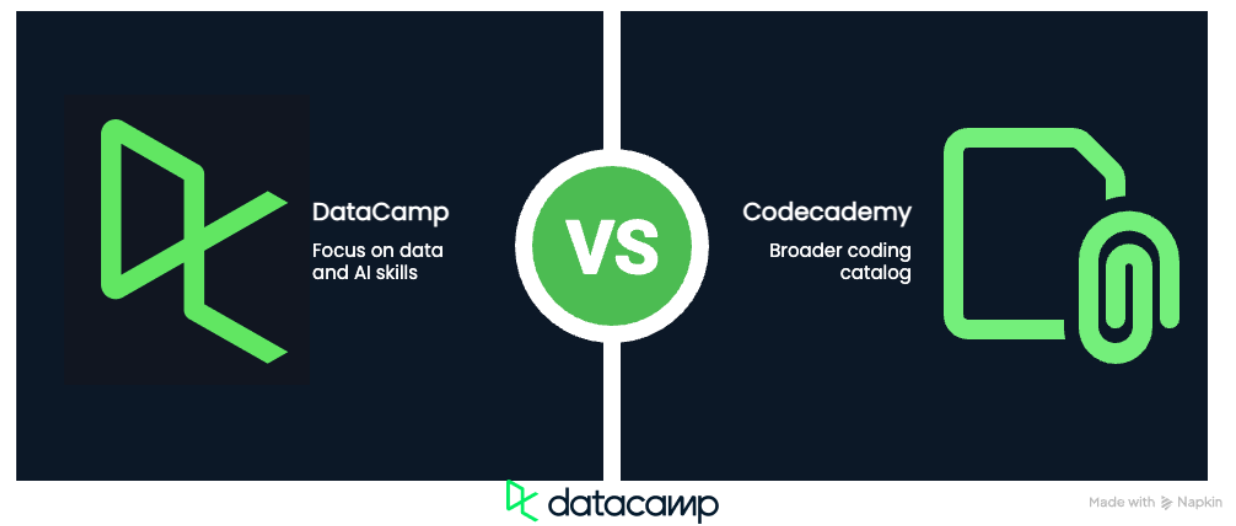When it comes to career upskilling, particularly in emerging areas like artificial intelligence, choosing the learning provider that best suits your goal and learning style is an important decision that will shape not just what you learn but how you apply it.
In this article, we’ll explore DataCamp versus Codecademy, two of the most popular platforms for learning technical skills online. We’ll examine key areas of comparison, including costs, curriculum, certifications, and learning styles. By the end, you should be able to determine which one is best for you and feel confident in your decision as you move forward, accomplishing your goals.
DataCamp vs Codecademy: TL;DR
If your focus is AI, data science, or analytics, DataCamp is purpose-built for you. It offers hands-on, in-browser learning, guided by instant feedback and a growing set of AI-powered tools such as DataLab and the platform’s AI Assistant. Certifications are included with a Premium subscription, and there are options to deliver data and AI training at an enterprise scale.
Codecademy, on the other hand, focuses on general programming education. It offers interactive courses and career paths in software engineering, web development, cloud, cybersecurity, and data science, with its Pro tier adding interview prep, career tools, and professional certifications for selected roles.
In short:
- Choose DataCamp for practical, job-ready skills in data and AI.
- Choose Codecademy if you’re exploring general programming across web, software, and cloud development.

DataCamp Cost vs Codecademy Cost
Cost is often a deciding factor. Here’s how the two compare at a glance. Note, this is based on pricing in the US and is subject to change.
|
Category |
DataCamp |
Codecademy |
|
Free access |
The first chapter of every course is free, and the Basic plan is free with limited access. |
Basic plan is free with limited access; quizzes and projects are not included. |
|
Individual subscription |
Premium: $14/month billed annually or $43 monthly. Teams: $14 per user/month billed annually. |
Plus: $14.99/month billed annually or $29.99 monthly. Pro: $19.99/month billed annually or $39.99 monthly. |
|
Business/teams |
Teams plan, Enterprise with SSO and LMS/LXP integrations. |
Teams: $24.92 per user/month billed annually; Enterprise with integrations and advanced options. |
|
Individual courses |
Access via subscription; no per-course pricing needed for library content. |
Access via Plus/Pro; no separate per-course purchases for catalog access. |
|
Certificates/certifications |
Certificates of completion and industry-recognized certifications included with Premium. |
Certificates of completion with Plus/Pro; Professional Certifications available on Pro for select career paths. |
|
Projects |
Step-by-step coding projects included with Premium and Teams. |
Real-world projects included with Plus and Pro. |
|
AI assistance |
Platform AI Assistant for guidance; DataLab’s AI assistant for analysis and code. |
AI learning assistance: limited on Basic; unlimited on Plus and Pro. |
DataCamp vs Codecademy: Curriculum Depth
DataCamp specializes in data and AI, offering structured paths in Python, SQL, R, and BI tools like Power BI and Tableau. Its courses range from beginner to advanced, covering everything from machine learning fundamentals to emerging tools in generative AI, with contributions from partners such as Hugging Face and LlamaIndex.
The curriculum emphasizes applied learning—projects, skill assessments, and a workspace to practice with real data, ensuring you move from theory to execution.
In short, the DataCamp curriculum emphasizes:
- Hands-on learning in Python, SQL, R, BI, and applied AI
- Fast-updating content aligned with modern AI tools and workflows
- Partnerships with major players in the market, including Microsoft, Replit, and more.
Codecademy focuses on more general coding and developer education. It offers programming and career paths across software engineering, web development, cloud, cybersecurity, and data science, along with an AI catalog that introduces key concepts and foundational ideas.
While it’s a great option for learners exploring programming across multiple technical domains, Codecademy’s data and AI content remains more introductory. It emphasizes a broad, language-based curriculum over the deeper, data-focused learning experience that DataCamp provides.
In short, the Codecademy curriculum emphasizes:
- Broad language and role coverage across the tech stack
- Skill and career paths with quizzes, projects, and assessments
- Optional certification prep for third-party exams in the business offering
AI Upskilling for Beginners
DataCamp vs. Codecademy Learning Styles
Everyone learns differently. Here’s how the platforms compare in delivery and support.
DataCamp offers interactive, in-browser coding and exercises with instant feedback across courses, practice, and projects. The platform’s AI Assistant helps learners navigate content, while DataLab’s AI assistant can generate code, fix errors, and let you “chat with your data.” All of this runs in the browser, with no local setup required.
Codecademy offers a browser-based coding environment with auto-graded quizzes, projects, and practice. Plus and Pro include unlimited AI learning assistance for explanations and code checks. Pro adds job-readiness tools, such as the Interview Simulator, technical interview prep, and certifications in select paths.
DataCamp vs. Codecademy Time Commitment
You’re probably wondering how you can fit learning around your schedule. Both platforms are self-paced, and your time investment will depend on the depth of your goal.
With DataCamp’s interactive learning approach, you build practical skills at your own pace, coding, analyzing, and applying concepts directly in your browser. Individual courses can be completed in just a few hours, while longer career or skill tracks may take weeks or months, depending on your schedule. Regular practice, projects, and guided code-alongs help reinforce what you’ve learned over time.
Codecademy is also self-paced. Its career paths typically range between 50 and 100 hours of content, depending on the topic and depth. You can work through short lessons, quizzes, and projects whenever it suits your schedule, with optional AI guidance and career tools available on the Pro plan. Actual time varies by learner and whether you do extras like articles and videos.
Quick view:
|
Category |
DataCamp |
Codecademy |
|
Learning pace |
Self-paced with interactive exercises and instant feedback. |
Self-paced with quizzes, projects, and AI assistance. |
|
Typical duration |
Short courses; longer tracks vary by path. Certifications have defined exam windows. |
Career paths often require ~50–100 hours, depending on the path. |
|
Flexibility |
Fully flexible; learn anytime in the browser or mobile app. |
Fully flexible; learn anytime in the browser or mobile app. |
|
Learning format |
Hands-on coding, practice sets, projects, code-alongs, and DataLab for AI-assisted analysis. |
Hands-on coding, quizzes, code challenges, projects, AI learning assistance, and interview practice on Pro. |
DataCamp vs. Code Academy: AI and Data Specializations
DataCamp is built for data and AI, no matter what level of learner you are. The curriculum covers foundational topics like Python, SQL, and data visualization, alongside advanced areas such as machine learning, generative AI, and agentic AI. Learners can progress through structured skill and career tracks or pursue specialized credentials, like the AI Engineer for Data Scientists Associate certification.
The content is designed to keep pace with industry trends, combining practical, hands-on learning with conceptual grounding in data and AI literacy. DataCamp also partners with leading AI organizations, ensuring that its training reflects the latest technologies shaping the field.
Codecademy also offers some data and AI content, albeit within a broader tech catalog. You’ll find AI subject pages, skill paths for developing basic AI skills, and exam prep. Codecademy’s data science career paths include certification options for some roles.
Certifications: DataCamp vs. Codecademy
DataCamp provides industry-recognized certifications across three groups: Career (e.g., Data Analyst, Data Scientist, Data Engineer), Technology (e.g., SQL Associate, Python Data Associate, plus partner-aligned options for Power BI, Tableau, Azure, AWS, KNIME), and Fundamentals (e.g., AI Fundamentals, Data Literacy).
Certifications are included with DataCamp Premium, are designed with an advisory panel of hiring managers, and Career/Technology certifications are valid for two years. Once you register, you have 30 days to complete all requirements, though there are relevant tracks you can complete beforehand.
Codecademy offers two types:
- Certificates of completion for finishing courses or paths (for Plus/Pro subscriptions).
- Professional Certifications for select career paths, which are awarded after passing all career-path exams. Current eligible paths include Full-Stack Engineer, Front-End Engineer, Back-End Engineer, Data Scientist: Machine Learning Specialist, Data Scientist: Analytics Specialist, and Computer Science.
Get certified in your dream data role
Our certification programs help you stand out and prove your skills are job-ready to potential employers.

DataCamp vs. Codecademy: Which to Choose?
Ultimately, the choice comes down to what you want to learn and how you prefer to learn
If you’re starting or developing a career in AI, data science, or analytics, DataCamp is the more focused choice. Its in-browser coding experience, data- and AI-centric library, and AI-enabled tools like DataLab are designed to help you build, apply, and prove your skills faster. With built-in certifications and continuously updated content aligned to emerging AI technologies, DataCamp offers a clear pathway from learning to job readiness. For teams, its enterprise features and integrations make large-scale upskilling measurable and effective.
If your goal is to explore a broader range of programming disciplines, from web and software development to cloud and cybersecurity, Codecademy provides that generalist coverage. Its Pro plan adds interview prep, career tools, and professional certifications for selected roles, making it a solid option if you are pursuing developer-focused career paths outside data and AI.

A senior editor in the AI and edtech space. Committed to exploring data and AI trends.

